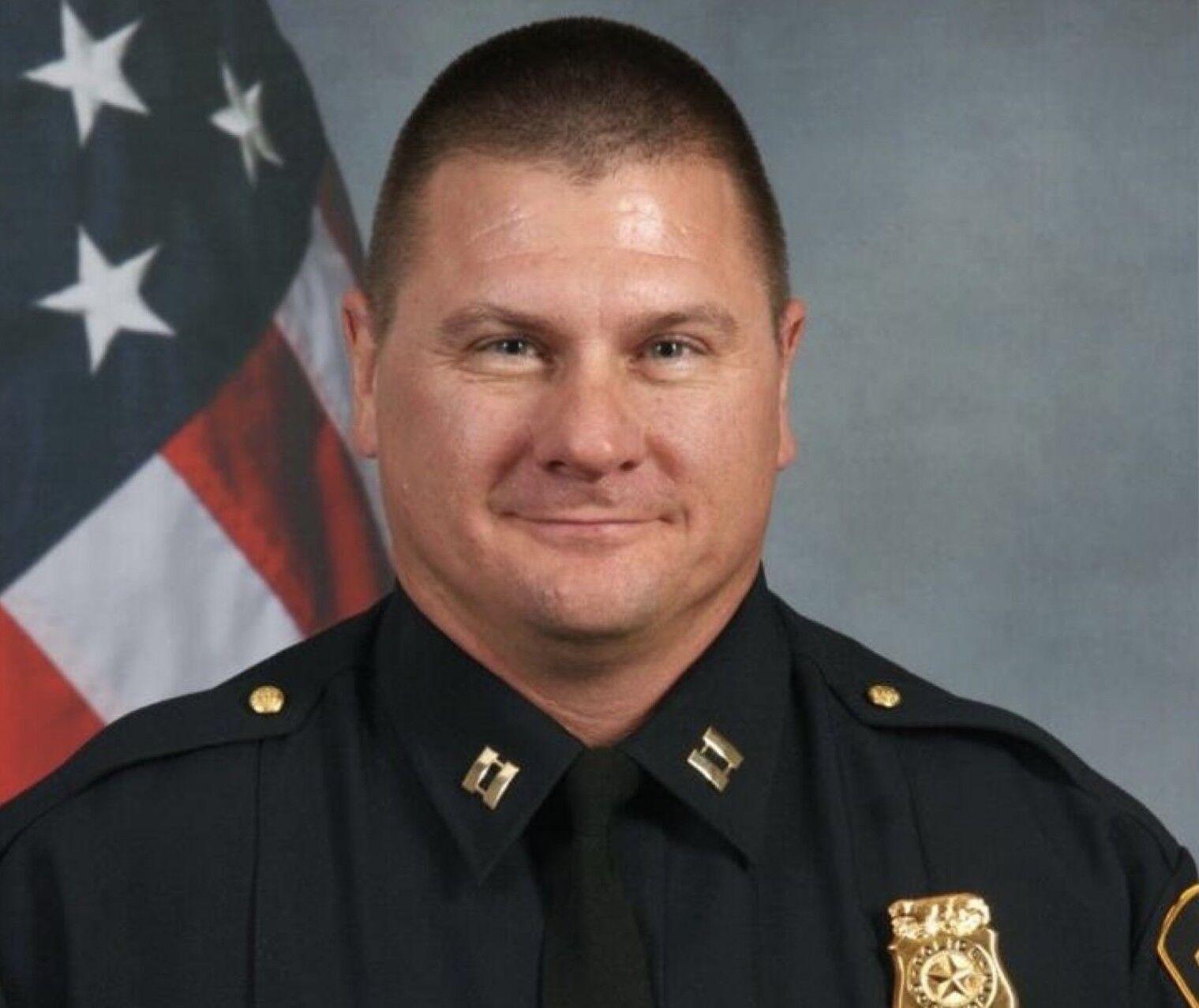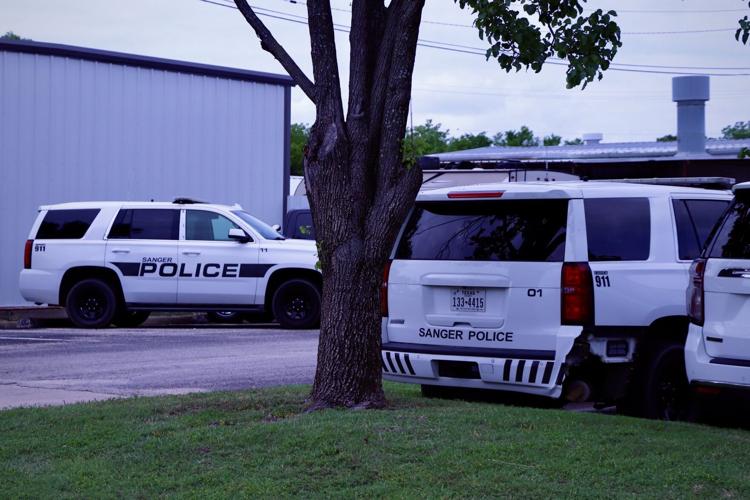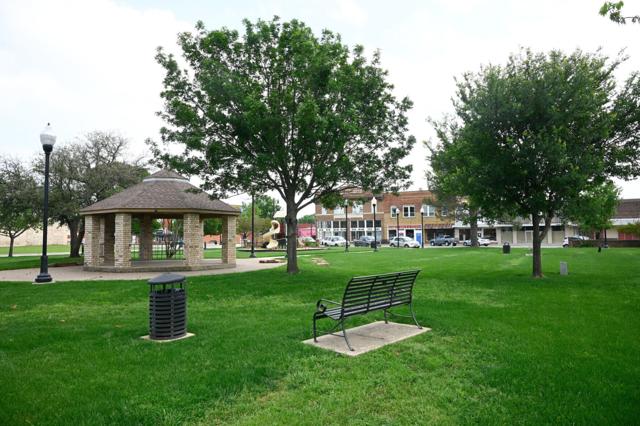Tyson Cheek, now officially Sanger’s police chief, on where the department’s come from and where it’s heading
Published: Mon, 12/18/23
Tyson Cheek, now officially Sanger’s police chief, on where the department’s come from and where it’s heading

Sanger Chief of Police Tyson Cheek
Courtesy photo
Denton Record-Chronicle
By Brooke Colombo Staff Writer
December 17, 2023
After several months acting as interim chief of police, Tyson Cheek was officially named the Sanger Police Department’s new chief.
Cheek comes with over 30 years of law enforcement experience and most recently served as a captain at the Fort Worth Police Department.
Before Cheek, the Sanger Police Department was headed by Wayland Rhodes, whose term as chief ended with the department facing allegations of misconduct and unprofessionalism.
Rhodes resigned without notice after less than two years at the helm. Several officers also left, leaving Sanger with half of its police force.
After taking over the department in a time of uncertainty, Cheek sat down with the Denton Record-Chronicle to discuss how his first months on the job have been and the department’s future under his leadership.
Some of his answers have been lightly edited for clarity.
What kind of reception have you received internally?
Given the circumstances when I got here with how the other chief left and my being hired from outside, the reception was kind of lukewarm at first. People weren’t sure what I was brought in to do or how I might do the things I was supposed to do.
It took a while for them to understand that my goal was to be there for them, support them and do what I could at the time to alleviate the stresses they were going through.
I think there might have been some thought I was there under some ulterior motives from city leadership to do more than get the department focused and moving ahead. And that wasn’t the case. So, it took a while to allay any fears for the officers and for them to understand that my goal was the department’s and their best interests and to move the department forward.
What about the reception from the public and city staff?
City staff has been wonderful and the city itself. Nothing but welcoming.
We’ve already had coffee with a cop event at the Starbucks. … I’ve made it a point to attend as many of the city events as I can get out, meet with the people, mingle with the people and just introduce myself. I made it a point about once a month to try to walk the square and visit with the business owners there.
I can honestly say that I don’t know that I’ve ever seen as much interest as I have from the citizens and business leaders in Sanger in greeting a new chief, or greeting me specifically. It’s been wonderful. Everybody has gone out of their way to make me feel welcome. I think part of that is because I make the effort to go out and let them know I’m here for them and to do the job for the department, for the city and for the citizens. I’ve done a couple of impromptu interviews at different events.
When you took over as interim chief, what were some of the things that you immediately saw the department was doing well?
Immediately before the former chief left, and shortly thereafter, they had a mass exodus of officers. Six or seven people just quit in a very short amount of time. Well, the department was only 16 people. So, you’ve got half a department doing the job of a fully staffed department.
These poor officers that stayed — and I’ll list them for you: Lt. Justin Lewis, Sgt. Reece Dunn, Sgt. Brandon Buttrum, Detective Bill Wilson, Officer Tyler Pruett, Officer Deleese Allen, Officer Stella Green, Officer Katie Harlan, Officer Tim Morton and Officer Hubble Richmond — the city owes them a big debt of gratitude and thanks. Those people kept the department functioning — the extended time that they had put in while being short-staffed. I can’t tell you how proud of those people I am who have the love for the city and the department to stay even through those struggles.
Being overworked in policing is bad for safety and it’s bad for their health. So, that was the big issue.
Oct. 1 was the beginning of the new budget year, and as of the end of September, we were fully staffed. Then Oct. 1, we gained a couple of positions, and we should be filling those positions here in the next three weeks.
There were other concerns with equipment, technology and stuff like that. But staffing was the big issue here for the officers and for the citizens.
Even before, when they were short-staffed, the officers were doing a wonderful job of patrol work. But when you can only go call to call because you’re short-staffed, you can’t do preventative crime work and you can’t patrol neighborhoods just to keep an eye on things. Now that we’re better staffed, the officers have more time to do that. They have time to do traffic enforcement if necessary. I can’t tell you how many compliments we’ve gotten from citizens who have called and said, “Hey, Officer So-and-So is golden.” And that’s the important thing.
How many people are employed at the department now and how many open positions are there?
Currently, we have 18 counting myself. So, there’s me, two lieutenants — they are what another department might call assistant chiefs — three sergeants and one sergeant vacancy, then we’ve got 11 officers and two officer vacancies.
The officer vacancies will probably be filled within the next three weeks. That one sergeant vacancy will probably be filled here within the next month. There’s a possibility the sergeant’s vacancy will be filled internally. I don’t think we’ve gotten an outside application at the moment. So that will create an additional officer vacancy. But when we get all of those spots filled, we’ll be sitting at 20 people, counting me.
Did you face any difficulties in recruiting new officers?
I don’t mean this to sound bragging. But I didn’t realize that reputations spread as quickly as they do through small departments. I mean, I’m used to Fort Worth. You generally came into that department with the expectation you’re gonna stay till retirement. So, what I found here that is awesome to me is that because small-town policing is reasonably transient, you have people that move from department to department in the small towns. Everybody in the Denton County area seems to know everybody from other departments.
What struck my heart and made me feel good is a lot of people who have come here have said, “We’ve heard about your reputation and the things you have going on here at the Sanger Police Department. That’s one of the reasons we actually decided to apply.” That’s exactly what I want to hear.
In regards to the vacancies, it’s really important to me that everybody understands: Filling the vacancies is important to me. But filling the vacancies with good people who are good officers is the most important to me.
We didn’t just post the positions and take whatever came to us. We posted the positions and we’ve turned several people away. That doesn’t mean I don’t allow for imperfections and second chances. But what’s important to me first is that the people we hire are good people who I know have a heart for service.
I won’t put a body in a Sanger police uniform just to put a body in it because I have to fill a vacancy.

Sanger Police Department vehicles are parked outside the police station at 209 N. Fifth Street in May.
Brooke Colombo/DRC file photo
Speaking of Fort Worth, have you noticed any other big differences? How has it been adjusting from a big city like Fort Worth to Sanger?
Well, ... Justin Lewis has been my guiding light in terms of procedures here and the way things operate. One of the things since I’ve gotten here is the transition from one records management system, reporting system, to a new one with Denton County. That’s something Wayland worked on that we instituted probably a month or so after I got here. That was a big transition changing from one computer-aided dispatch system to another.
But policing is policing wherever you go. Supervising people, once you’ve established those relationships, is pretty much the same wherever you go. It’s just the processes and stuff like that that’s different, and learning what my responsibilities are to city management and City Council. But if you can deal with people, you can deal with people anywhere.
When you became interim, you had mentioned going through personnel files. Have you had the opportunity to do that? What did you glean from them?
Yeah. So, to be honest, there’s not a lot there. The officers that are here, you know those basic personnel files on stuff that wasn’t a lot of disciplinary records. There weren’t a lot of disciplinary issues.
For officers that left, there wasn’t really a whole lot of reason for me to go through their files. I think one of the things that Wayland Rhodes was doing when he left was trying to make the department and make the officers more accountable. I won’t say that’s why some of the previous officers have left. But it’s some of the gripes I had heard about some of the officers that left was that accountability, or the way Wayland was going about it, became a problem.
Most of the issues were addressed before I got here. Some of the allegations that were made, I talked to city management because some of those allegations were addressed by them. ... Lt. Justin Lewis essentially took over the department once Wayland left and until I arrived. Even since I arrived, [Lewis] has been my guiding light in terms of the history of the department, what was going on before I got here, how the department functions compared to what I’m used to.
He advised that the [officer-supervisor] issues that were mentioned that were in regards to [former Officer Cole Thompson] had already been dealt with and supervisors have been instructed on how those issues should be monitored in the future.
I asked about that stuff, too, when I got here. Like, what do I need to know about the allegations? Some of the allegations were specifically directed at [Thompson]. The city manager said those had been investigated and they were nonsense. So, I just wanted to make sure and was like, “What officers do I have to worry about?”
How are you going to hold officers accountable to goals and standards in the future?
I have reasonably regular meetings with my supervisors. I’ve got to tell you when I came in — I don’t mean this to be a poor reflection on Wayland because I’m not sure what the circumstances were of his leaving. But I’ve spent most of the first several months of my time here — aside from dealing with the other things that we’ve talked about — trying to find where the department is, what he had done in terms of doing things for the department for the future, what projects he had left in the middle of, what projects he hadn’t started. I’m finding things that were done that weren’t utilized or were in the process of being utilized.
So, basically, when I got here, I don’t want to say it’s like starting from scratch building a department, because obviously the department’s here. But there was no succession planning. There was nothing left for whoever might take over. It was just like Wayland was here one day and the next day he was gone. It was like, “Here’s your leadership job. We don’t know what direction you need to go or what things have been done.” I spent a lot of time digging through stuff and researching.
But going back to the original question, I talk with my officers on a daily basis. The last several nights, I’ve stayed here until 8 or 9 o’clock just to visit, especially with the night guys. My supervisors understand we have reasonable expectations of what an officer should do. Now that staffing allows for them to be supervisors instead of fellow officers, they’re expected to monitor what their officers are doing in a better fashion. Supervisors can’t really be supervisors if they’re doing an officer’s job because staffing is so short.
What are some other notable actions you’ve taken unrelated to recovering from the events before your incoming?
I think my biggest attribute is that I’m a people guy. I think that was probably the biggest thing I had going for me in terms of winning the officers over. I think I’m liked by city staff and the people too.
So, building trust with the officers and letting them know that even before I was named to the permanent position, the department and theirs are the interests that matter to me. But obviously, we work for the citizens.
It’s my mission to do the best by what I consider the people I work for: that’s the citizens, that’s my bosses — the city manager, the City Council — and my officers. I work with them, but I also work for them. That’s the philosophy I’ve carried throughout my career in leadership. Those are my three groups of constituents, and I have to be able to do well by all three.
If I do well by my officers and stress that same philosophy to them, then the goal is that as they take that goal into their lives and careers, then they’ll do well by the citizens and things just get better from there.

Sanger’s downtown square, shown in 2020.
DRC file photo
Would you say there are any prevalent crimes in Sanger the department has or needs to address? Are there any things that stick out to you, crime-wise?
Sanger really isn’t that bad. I mean, we’ve got thefts like everybody else. The biggest thing that we have to deal with is quality of life issues. There’s not a lot of violent crime in Sanger and not a lot of property crime.
A lot of the calls we get are relationship-based calls. Interpersonal relationships, assaults, family arguments, runaway kids. I’ve had a couple of those. But again, I’m talking small numbers. Sanger is a very nice, relatively peaceful town.
Are there any areas where the department is lacking?
I think the department is lacking community relations. One of my intents is when we get completely staffed, we’re going to designate an officer as the community relations officer. It’s going to be our job to try to work with the community and the city to try to build crime watches, do crime prevention, stuff that people may be able to come to, work with the schools, educational-type stuff for the citizens, teaching them about crime prevention and hardening targets to reduce basic thefts, working with business leaders to maybe do security.
Moving forward, I think our biggest benefit to the city will be those community outreaches and working with the city for crime prevention stuff.
What are your views or goals for communication and transparency with the public?
I’m looking at some software for the website that will allow citizens to look at the crime stats and stuff like that online, like crime mapping. We’ve already contracted with it. It’s just working with them to give them access to the department’s data through Denton County. And then these public forums and stuff like that, along with the community relations officer.
Overall, what’s your vision or goal for the department?
As trite as it sounds, my goal is that before I retire and ride off into the sunset, we wind up as Sanger being the best small department in the state. And we do that by setting achievable goals. We work at making Sanger the best small department in Denton County.
That’s probably a good start. When I think we achieve that, we bump that goal for Sanger to be the best small department in North Texas, and we go up from there. That involves a lot, and we have to set the measurables for that. I’m not sure what those are yet. But I think if we have a department that works hard to make Sanger safe, and welcoming for citizens and businesses and those that visit, and we work to make the department one that citizens and the city are proud of, I think that’s a pretty good start.
Is there anything else we haven’t discussed that you’d like to touch on?
Like I said, I really want the citizens to know the big kudos to those officers who stayed after the mass exodus. I think of all the things — and I didn’t know these people at the time — I couldn’t be prouder of what I’ve learned about those people who stayed.